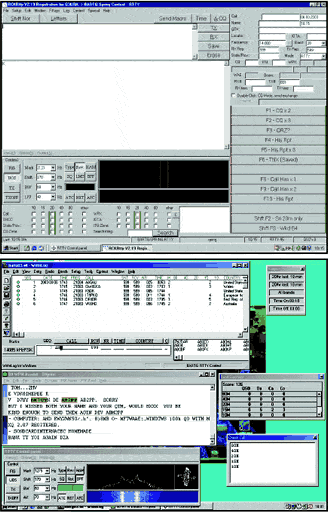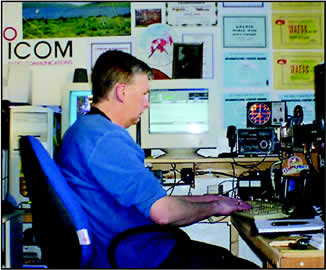RSGB Contests Committee. Features and Articles.
A Beginner’s Guide to RTTY Contests. Republished
from RadCom, August 2003. Copyright RSGB. www.rsgb.org
Whilst this is all very well, and can also
give the ‘novice’ contester a flavour of
what can be worked during an RTTY contest, MMTTY is
not Before the Contest. Entering a contest can be a bit daunting
the first time. The following few paragraphs are aimed
to help the beginner take the plunge and offer a few
tips from both avid contesters and a contest manager.
The first rule in any contest must be: “Read The
Rules!” The rules for all |
|
| Always keep a copy of the rules handy. Before the contest, set up some simple memory ‘buffers’ containing only the minimum information required for calling another station and exchanging the relevant information. It is also a good idea to add a couple of ‘return’ characters to the beginning and end of the exchange, as this can make your exchange stand out a little more. For a contest where the time also has to be exchanged, the buffers might look like this: “DE GW4SKA GW4SKA K” (Use this to answer a CQ. Never send his call and always send the ‘DE’, see below). “RGR UR 599 001 001 1254 1254 DE GW4SKA K” (meaning I have your message, this is mine for you). These will be fine in most conditions but be prepared to repeat the serial / time etc several times if copy is poor, like this: “001 001 001 TIME 1254 1254 1254 QSL? BK.” Set up a separate buffer for this. There is no need to repeat the RST as it is always 599 no matter what the conditions! During the Contest. Never send any unnecessary information such as names, your rig, power or aerial details. Also, even if the station worked is a new country for you, never ask for his QSL information, as you can find this out after the contest. Remember that the serious contester will be aiming to make about two contacts every minute, so stick to the essential information only. Remember too, to call exactly on the other station’s frequency and keep the ‘AFC’ and ‘NET’ controls turned off when answering a CQ. Think about your exchanges and watch what others are doing. Most of us know our own callsign so seeing it three times before we see your callsign just once, is a real ‘no-no’. For example, sending “GU0SUP GU0SUP GU0SUP DE G3URA PSE K” will probably not get you that muchneeded GU multiplier! Know what the ‘multipliers’ are. Are they countries? Prefixes? Zones? This will be explained in the rules, which you will have read before the contest, right? Are there bonus points for working different continents? If you run a ‘little pistol’ station where anything outside Europe is a bonus, don’t forget that the Canary Islands, EA8, counts as Africa, and Cyprus, 5B4 or ZC4, counts as Asia. Both are fairly ‘local’ and easily worked. Having a ‘little pistol’ station can have some advantages, as most of the time you will be in ‘S&P’ (‘search and pounce’) mode while the ‘big guns’ will sitting on one frequency calling CQ. You can pick and choose whom you work; they can’t. Never forget that they want your call and will do their best to get you in their log. This is especially true if you have a regional locator in your callsign, such as GM or GI. If they are rare DX and have a huge pile-up, worry not. If it is a 48-hour contest wait 24 hours and call them on the second day, when they will be crying out for contacts and will want you in their log. |
Top: Typical contest logging
software screen: this is the RCKRtty program configured
forthe BARTG Spring RTTY
Bottom: Using the WriteLog program for an RTTY contest. |
If you do have to wait patiently for your turn to work the DX, again, watch what is going on: there should be no need to ask for a repeat of his serial number, for example. In some contests, suchas the Australian ANARTS, points are based on distance worked and in these types of test it is far better to trawl the bands looking for DX rather thanjust work mainly European stations. Watch out for time limits on band changes or off times. These will be in the rules. If, for example, you are limited to two band changes in 10 minutes don’t work that one multiplier on 10 metres if you can’t hear any other stations, or you will then have to sit on a quiet band until the 10-minute time period has elapsed (however, if you just can’t resist working that VP6 before returning to 20m, you can always use up the rest of the time with a ‘comfort break’!) If you are keen to try CQing, even with your ‘little pistol’ station, think about doing so in the dying hours of the contest. Then, many of the big boys will start to search and pounce for those extra contacts that escaped them during the main part of the contest.
|
|
| Intrested? More
information about RTTY contesting and the datamodes in general can be
found by joining BARTG, from which several RTTY awards are available.
There is also a popular RTTY reflector where you can ask
questions, find QSL routes, and compare contest scores. Other helpful |
Co-author Phil Cooper, GU0SUP, operating RTTY from Guernsey. |
W E B S E A R C H (1) www.writelog.com |
By John Barber, GW4SKA, 29 Brithdir Street, Cathays,
Cardiff CF24 4LE.
|


